
A database widely used by police departments across California has little oversight and major flaws, including naming dozens of babies as active gang members, according to a state audit released Thursday.
Known as CalGang, the database has been used by authorities for years to keep track of criminal gangs and their members, but the California State Auditor found some law enforcement agencies could not corroborate some of the information added to the system, including people identified as gang members or proof used to identify them as such.
Among the audit's troubling findings were 42 individuals under 1 year old who were named as suspected gangsters in the system.
According to the information in the database, 28 of the months-old babies had been entered for "admitting to being members."
A spokeswoman for the California State Auditor told BuzzFeed News that although the review looked into errors and flaws in the system, the audit did not dive into why or how the errors were made, so it was unclear why some of the names in the system included months-old suspects.
"The errors that we found, some of them could have been typos," Margarita Fernandez told BuzzFeed News.

The audit also found other flaws in the system, including little oversight, lack of transparency, and trouble validating why some people were included in the system.
Out of 100 entries reviewed by the auditors, for example, 13 were "inappropriately" added.
The CalGang Executive Board and California Gang Node Advisory Committee, which oversee the database, also appeared to have violated their own policies about the database, such as deleting entries after five years if no new information was obtained.
More than 600 people in the database were input for a term longer than five years, the audit found, and some were not scheduled to be purged from the list for more than 100 years.
The California State Auditor offered several recommendations to fix the database, including that the California Justice Department be placed in charge of it. Programming changes to the system that would highlight possible errors are also being recommended.
